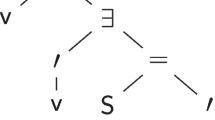Abstract
In this paper I discuss what, according to my long experience, every computer scientists should know from logic. We concentrate on issues of modeling, interpretability and levels of abstraction. We discuss what the minimal toolbox of logic tools should look like for a computer scientist who is involved in designing and analyzing reliable systems. We shall conclude that many classical topics dear to logicians are less important than usually presented, and that less known ideas from logic may be more useful for the working computer scientist.
Similar content being viewed by others
References
Abramsky, S.: Sequentiality vs. concurrency in games and logic. Math. Struct. Comput. Sci. 13(4), 531–565 (2003)
Barwise, J., Feferman, S. (eds.): Model-theoretic Logics. Perspectives in Mathematical Logic. Springer, New York (1985)
Blass, A., Gurevich, Y.: Why sets? In: Avron, A., Dershowitz, N., Rabinowich, A. (eds.) Pillars of Computer Science: Essays Dedicated to Boris (Boaz) Trakhtenbrot on the Occasion of His 85th Birthday, Lecture Notes in Computer Science, vol. 4800, pp. 179–198. Springer, New York (2008)
Börger, E., Grädel, E., Gurevich, Y.: The Classical Decision Problem. Springer, New York (1997)
Boolos, G.: The consistency of Frege’s “foundations of arithmetic”. In: Logic, Logic, Logic, pp. 182–201. Harvard University Press, Cambridge (1998)
Boolos, G.: Logic, Logic, Logic. Harvard University Press, Cambridge (1998)
Boolos, G.: On the proof of Frege’s theorem. In: Logic, Logic, Logic, pp. 275–90. Harvard University Press, Cambridge (1998)
Bornat, R.: Proof and disproof in formal logic. Number 2 in Oxford Texts in Logic. Oxford University Press, Oxford (2005)
Burgess, J.P.: Fixing Frege. Princeton University Press, Princeton (2005)
Buss, S. (ed.): Handbook of Proof Theory. Studies in Logic and the Foundations of Mathematics, vol. 137. Elsevier, Amsterdam (1998)
Devlin, K.: The Joy of Sets: Fundamentals of Contemporary Set Theory. Springer, New York (1993)
Ebbinghaus, H.D., Flum, J.: Finite Model Theory. Perspectives in Mathematical Logic. Springer, New York (1995)
Feferman, S.: The Number Systems: Foundations of Algebra and Analysis. Addison-Wesley, Reading (1964)
Fagin, R., Halpern, J., Moses, Y., Vardi, M.: Reasoning About Knowledge. MIT, Cambridge (1995)
Fine, K.: The Limits of Abstraction. Oxford University Press, Oxford (2002)
Girard, J.-Y.: Locus solum: From the rules of logic to the logic of rules. Math. Struct. Comput. Sci. 11.3, 301–506 (2001)
Grädel, E., Kolaitis, P., Libkin, L., Marx, M., Spencer, J., Vardi, M., Venema, Y., Weinstein, S.: Finite Model Theory and its Applications. Springer, New York (2007)
Glikson, A., Makowsky, J.A.: NCE graph grammars and clique-width. In: Bodlaender, H.L. (ed.) Proceedings of the 29th International Workshop on Graph-Theoretic Concepts in Computer Science (WG 2003), Elspeet (The Netherlands), Lecture Notes in Computer Science, vol. 2880, pp. 237–248. Springer, New York (2003)
Godement, R.: Cour d’Algèbre. Hermann, Paris (1966)
Gurevich, Y.: Logic and the challenge of computer science. In: Börger, E. (ed.) Trends in Theoretical Computer Science, Principles of Computer Science Series, chapter 1. Computer Science, Rockville (1988)
Hilbert, D., Ackermann, W.: Grundzuge der Theoretischen Logik. Springer, New York (1928)
Hilbert, D., Ackermann, W.: Grundzuge der Theoretischen Logik, 3rd edn. Springer, New York (1949)
Hilbert, D., Ackermann, W.: Principles of Mathematical Logic. Chelsea, New York (1950)
Halmos, P.: Naive Set Theory. Van Nostrand, New York (1960)
Hyland, J.M.E., Ong, C.-H.L.: On full abstraction for pcf: I, ii, and iii. Inf. Comput. 163.2, 285–408 (2000)
Jech, T.: Set Theory. Academic, New York (1978)
Kennedy, H.C.: What Russel learned from Peano. Notre Dame J. Form. Log. 14.3, 367–372 (1973)
Landau, E.: Die Grundlagen der Analysis. American Mathematical Society, Providence (1999)
Levy, A.: Basic Set Theory. Springer, New York (1979)
Libkin, L.: Elements of Finite Model Theory. Springer, New York (2004)
Maddy, P.: Realisms in Mathematics. Oxford University Press, Oxford (1990)
Maddy, P.: Naturalisms in Mathematics. Oxford University Press, Oxford (1998)
Makowsky, J.A.: On some conjectures connected with complete sentences. Fundam. Math. 81, 193–202 (1974)
Makowsky, J.A.: Model theoretic issues in theoretical computer science, part I: relational databases and abstract data types. In: Lolli, G., et al. (eds.) Logic Colloquium ’82, Studies in Logic, pp. 303–343. North Holland, Amsterdam (1984)
Makowsky, J.A.: Abstract embedding relations. In: Barwise, J., Feferman, S. (eds.) Model-Theoretic Logics, Perspectives in Mathematical Logic, chapter 20. Springer, New York (1985)
Makowsky, J.A.: Compactness, embeddings and definability. In: Barwise, J., Feferman, S. (eds.) Model-Theoretic Logics, Perspectives in Mathematical Logic, chapter 18. Springer, New York (1985)
Makowsky, J.A.: Model theory and computer science: an appetizer. In: Abramsky, S., Gabbay, D., Maibaum, T. (eds.) Handbook of Logic in Computer Science, vol. 1, chapter I.6. Oxford University Press, Oxford (1992)
Makowsky, J.A.: Algorithmic uses of the Feferman-Vaught theorem. Ann. Pure Appl. Logic 126.1–3, 159–213 (2004)
Makowsky, J.A.: From a zoo to a zoology: descriptive complexity for graph polynomials. In: Beckmann, A., Berger, U., Löwe, B., Tucker, J.V. (eds.) Logical Approaches to Computational Barriers, Second Conference on Computability in Europe, CiE 2006, Swansea, UK, July 2006, Lecture Notes in Computer Science, vol. 3988, pp. 330–341. Springer, New York (2006)
Makowsky, J.A., Mundici, D.: Abstract equivalence relations. In: Barwise, J., Feferman, S. (eds.) Model-Theoretic Logics, Perspectives in Mathematical Logic, chapter 19. Springer, New York (1985)
Moschovakis, Y.: Notes on Set Theory. Springer, New York (1994)
Manna, Z., Pnueli, A.: Temporal Verification of Reactive Systems. Springer, New York (1995)
Papadimitriou, C.: Computational Complexity. Addison Wesley, Reading (1994)
Rossman, B.: Homomorphims preservation theorems. J. ACM 55.3, 1–54 (2008)
Scholz, H.: Problem # 1: ein ungelöstes problem in der symbolischen logik. J. Symb. Log. 17, 160 (1952)
Schwartz, L.: Cour d’Analyse. Hermann, Paris (1967)
Shapiro, S.: Thinking about Mathematics. Oxford University Press, Oxford (2000)
Shoenfield, J.: Mathematical Logic. Addison-Wesley Series in Logic. Addison-Wesley, Reading (1967)
Wilder, R.L.: Mathematics as a Cultural System. Pergamon, New York (1981)
Author information
Authors and Affiliations
Corresponding author
Additional information
For Witek Marek, first mentor, then colleague and true friend, on the occasion of his 65th birthday.
Rights and permissions
About this article
Cite this article
Makowsky, J.A. From Hilbert’s program to a logic tool box. Ann Math Artif Intell 53, 225–250 (2008). https://doi.org/10.1007/s10472-009-9115-z
Published:
Issue Date:
DOI: https://doi.org/10.1007/s10472-009-9115-z




